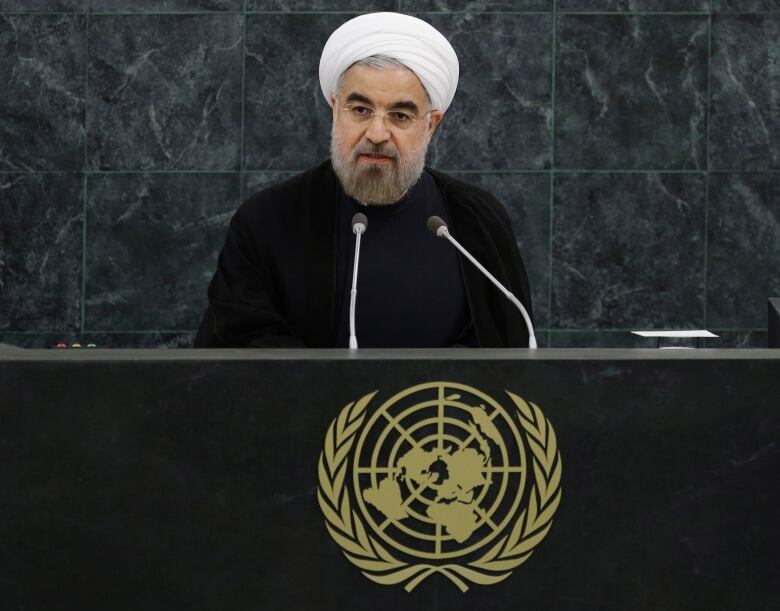Obama, Iran's Rouhani back new nuclear talks
U.S. and Iranian presidents don't meet despite both being at the UN
President Barack Obama and new Iranian President Hassan Rouhani both spoke up forcefully for a resumption of stalled nuclear negotiations Tuesday at the United Nations, but they gave no ground on the long-held positions that have scuttled previous attempts to break the tense impasse.
The leaders' separate appearances at the United Nations General Assembly came amid heightened speculation about a thaw in U.S.-Iranian relations following the election of Rouhani, a more-moderate sounding cleric. In fact, officials from both countries had quietly negotiated the possibility of a brief meeting between Obama and Rouhani. But U.S. officials said the Iranians told them Tuesday that an encounter would be "too complicated" given uncertainty about how it would be received in Tehran.

Instead, Obama and Rouhani traded hopeful-yet-unyielding messages during public addresses hours apart at the annual UN. meetings.
Obama declared that it was worth pursuing diplomacy with Iran even though skepticism persists about Tehran's willingness to back up its recent overtures with concrete actions to answer strong concerns at the U.N. and in many nations that the Iranians are working to develop a nuclear bomb.
"The roadblocks may prove to be too great, but I firmly believe the diplomatic path must be tested," Obama said. He added that he while he was "encouraged" byRouhani'selection, the new president's "conciliatory words will have to be matched by actions that are transparent and verifiable."
Harper: Iranian deeds key torelations thaw
Prime Minister Stephen Harper says he will encouragediplomatic efforts to settle the Iranian nuclear question, but he warnsthat Iran must be judged by deeds, not words.
"One will see," he said during a news conference Tuesday withJapanese Prime MinisterShinzoAbe.
"I certainly would not fault President Obama and our allies fromtrying, but my sincere advice would be when it comes to thegovernment of Iran we should carefully monitor deeds far more thanwords."
Harper also said he has no immediate plans to re-open theCanadian embassy in Tehran.
Canada broke off diplomatic relations with Iran a year ago,pulling its diplomats home and ordering Iran's embassy staff out.
Source: The Canadian Press
Rouhani, making his international debut, said Iran was ready to enter talks "without delay" and insisted his country was not interested in escalating tensions with the U.S. He said Iran must retain the right to enrich uranium, but he vigorously denied that his country was seeking to build a nuclear weapon.
"Nuclear weapons and other weapons of mass destruction have no place in Iran's security anddefensedoctrine, and contradict our fundamental religious andethnicalconvictions,"Rouhanideclared. "Our national interests make it imperative that we remove any and all reasonable concerns about Iran's peaceful nuclear program."
He strongly criticized the economic sanctions that have been imposed on Iran as part of the effort to persuade its leaders to open its nuclear programs to international inspection. The sanctions have badly hurt Iran's economy, andRouhanicalled them "violent" in their impact. He also said that U.S. drone strikes that kill civilians in the name of fighting terrorism should be condemned.
U.S. officials said they were not surprised to seeRouhanipublicly stake out those positions on the international stage. Still, they say they see him as a more moderate leader elected by an Iranian public frustrated by international isolation and the crippling sanctions.
However, the Obama administration is unclear whetherRouhaniis willing to take the steps the U.S. is seeking in order to ease the sanctions, including curbing uranium enrichment and closing the undergroundFordonuclear facility.
The U.S. and its allies have long suspected that Iran is trying to produce a nuclear weapon, though Tehran insists its nuclear activities are only for producing energy and for medical research.
Even without a meeting between Obama andRouhani, it was clear that the U.S. and Iran were edging close to direct talks. Obama said he was tasking Secretary of State John Kerry with pursuing the prospect of a nuclear agreement with Iran. Kerry, along with representatives from five other world powers, is to meet Thursday with Iran's new foreign minister, MohammadJavadZarif.
If Kerry andZarifhold one-on-one talks on the sidelines of that meeting, it would mark the first direct engagement in six years between a U.S. secretary of state and an Iranian foreign minister. A spokeswoman forZarifsaid Thursday's meeting indeed would mark the beginning of a "new era" in relations with the West.
The potential for direct engagement between the U.S. and Iran was being closely watched by Israel, which has long sought tough punishments against Tehran in retaliation for its nuclear program. FollowingRouhani'sspeech, Israeli Prime Minister BenjaminNetanyahuaccused him of "hypocrisy" and said the new Iranian leader showed no sign of halting his nuclear program.
"This is precisely the Iranian intention, to talk and buy time in order to advance its ability to achieve nuclear weapons,"Netanyahusaid.
A Canadian diplomat attendedRouhani'sspeech at the UN, marking the first time in years Canada has had representation at the speech of an Iranian president.
In 2009, Canada's delegation walked out on the speech. Canada did not attend the Iranian leader's speeches in 2010, 2011 and 2012.A Canadian diplomat attendedRouhani'sspeech at the UN, marking the first time in years Canada has had representation at the speech of an Iranian president.













_(720p).jpg)


 OFFICIAL HD MUSIC VIDEO.jpg)
.jpg)



























































































